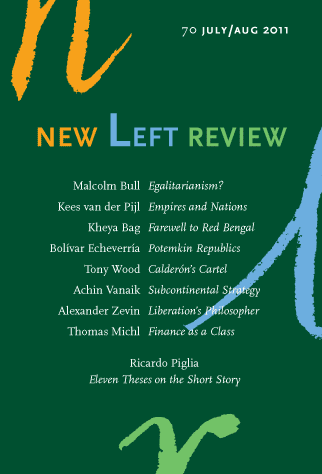
CONTENTS
-
Malcolm Bull: Levelling Out
Beyond existing arguments about equality, might the praxes of permanent and passive revolution offer a way to conceptualize a more expansionary levelling? Drawing on motifs from Nietzsche, Babeuf, Marx and Gramsci, Malcolm Bull traces the contours and consequences of extra-egalitarianism.
-
Kees van der Pijl: Arab Revolts and Nation-State Crisis
The triple crisis—of Western hegemony, of capital and of the nationstate form—within which the Arab uprisings of 2011 have unfolded, and longer-run history of Anglo-American strategies for containing popular aspirations to sovereignty.
-
Bolívar Echeverría: Potemkin Republics
In his final essay, the late Bolívar Echeverría considers the bicentennial history of Latin America’s oligarchic states. While elites stage empty rituals of affirmation, might the continent’s marginalized majorities be reimagining national identity?
-
Ricardo Piglia: Theses on the Short Story
Argentina’s leading novelist reflects on the hidden architecture of the form, and the unfolding of its iterations from Chekhov to Hemingway, Kafka to Borges.
-
Kheya Bag: Red Bengal's Rise and Fall
After the CPM’s ejection from office in Calcutta, how to explain the remarkable longevity of its rule and causes of its eventual downfall? Kheya Bag surveys the record of its three decades in power, and the mechanisms that sustained—and subverted—the party’s hold on the state.
-
Achin Vanaik: Subcontinental Strategies
Achin Vanaik explores the specificities of India’s social formation and its lefts, in the only country where both Stalinism and Maoism remain significant political actors. In the wake of recent electoral reverses, what are the prospects for radical renewal?
-
Thomas Michl: Finance as a Class?
Thomas Michl on Gérard Duménil and Dominique Lévy, The Crisis of Neoliberalism. Analytical long view of the Great Recession, seeing its origins in the stranglehold of finance and elite self-enrichment.
-
Tony Wood: Silver and Lead
Tony Wood on Anabel Hernández, Los señores del narco. The structures of political complicity and corruption that have fuelled Mexico’s drug wars.
-
Alexander Zevin: Critique of Neo-Colonial Reason
Alexander Zevin on Paige Arthur, Unfinished Projects. Restoring Sartre’s engagements with decolonization and anti-imperialism to their rightful place within his oeuvre.
Articles:
-
Kheya Bag,
‘Farewell to Red Bengal’
After the CPM’s ejection from office in Calcutta, how to explain the remarkable longevity of its rule and causes of its eventual downfall? Kheya Bag surveys the record of its three decades in power, and the mechanisms that sustained—and subverted—the party’s hold on the state.
-
Bolívar Echeverría,
‘Potemkin Republics’
In his final essay, the late Bolívar Echeverría considers the bicentennial history of Latin America’s oligarchic states. While elites stage empty rituals of affirmation, might the continent’s marginalized majorities be reimagining national identity?
-
Achin Vanaik, ‘Subcontinental Strategies’
Achin Vanaik explores the specificities of India’s social formation and its lefts, in the only country where both Stalinism and Maoism remain significant political actors. In the wake of recent electoral reverses, what are the prospects for radical renewal?
-
Ricardo Piglia,
‘Theses on the Short Story’
Argentina’s leading novelist reflects on the hidden architecture of the form, and the unfolding of its iterations from Chekhov to Hemingway, Kafka to Borges.
Editorials:
-
NLR at 50,
What remains of the neo-liberal order after the implosion of 2008—with what implications for a journal of the left? Notes for a future research agenda, as NLR enters its quinquagenary year.
-
Wall Street Crisis,
Against mainstream accounts, Peter Gowan argues that the origins of the global financial crisis lie in the dynamics of the New Wall Street System that has emerged since the 1980s. Contours of the Atlantic model, and implications—geopolitical, ideological, economic—of its blow-out.
-
NPT,
What are the geopolitical origins of the NPT, and what are its actual effects? Non-proliferation as nuclear privilege of the few, weapon of intimidation of the one, submission of the many—and its impact on the peace movement.
-
Afghanistan,
Reasons for the West’s stalemate in Afghanistan sought neither in lack of troops and imperial treasure, nor in Pakistani obstruction, but in the very nature of the occupation regime. Tariq Ali on the actual results of ‘state-building’ in the Hindu Kush, as a broken country is subjected to the combined predations of NGOs and NATO.
-
Concert of Powers,
A reckoning of global shifts in political and economic relations, with China emerging as new workshop of the world and US power, rationally applied elsewhere, skewed by Israeli interests in the Middle East. Oppositions to it gauged, along with theoretical visions that offer exits from the perpetual free-market present.
-
Force and Consent
As war looms again in the Middle East, what are the aims of the Republican Administration, and how far do they mark a break in the long-term objectives of US global strategy? The changing elements of American hegemony in the post-Cold War world.
Articles:
-
Kees van der Pijl, ‘Arab Revolts and Nation-State Crisis’
The triple crisis—of Western hegemony, of capital and of the nationstate form—within which the Arab uprisings of 2011 have unfolded, and longer-run history of Anglo-American strategies for containing popular aspirations to sovereignty.
-
Thomas Michl,
‘What Kind of Crisis?’
Thomas Michl on Gérard Duménil and Dominique Lévy, The Crisis of Neoliberalism. Analytical long view of the Great Recession, seeing its origins in the stranglehold of finance and elite self-enrichment.
-
Alexander Zevin, ‘Sartre’s Anti-Colonialism’
Alexander Zevin on Paige Arthur, Unfinished Projects. Restoring Sartre’s engagements with decolonization and anti-imperialism to their rightful place within his oeuvre.
-
Tony Wood, ‘Calderón’s Cartel’
Tony Wood on Anabel Hernández, Los señores del narco. The structures of political complicity and corruption that have fuelled Mexico’s drug wars.
-
Perry Anderson,
‘On the Concatenation in the Arab World’
From Tunis to Manama, 2011 has brought a chain-reaction of popular upheavals, in a region where imperial domination and domestic despotism have long been entwined. A call for political liberty to reconnect with social equality and Arab fraternity, in a radical new internationalism.

